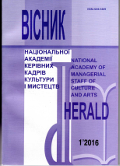ВІРТУАЛЬНІСТЬ МАСОВОЇ КУЛЬТУРИ ЯК ПОЛЕ КОНСТРУЮВАННЯ УЯВНИХ ІДЕНТИЧНОСТЕЙ
DOI:
https://doi.org/10.32461/2226-3209.1.2016.138468Ключові слова:
віртуальність, віртуальна реальність, масова культура, ідентичність, інтернет-спільнотиАнотація
Стаття присвячена віртуалізації сучасного культурного простору, зокрема масової культури. Розкрито основні властивості й характеристики феномена віртуальності, проаналізовано процес віртуалізації з точки зору його позитивного і негативного значення для людини. Особлива увага приділяється ролі віртуальної реальності в набутті індивідом уявних ідентичностей, а також створенню віртуальних образів у процесі спілкування в інтернеті.
##submission.downloads##
Опубліковано
Номер
Розділ
Ліцензія
Автори, які публікуються у цьому журналі, погоджуються з наступними умовами:
1. Автори залишають за собою право на авторство своєї роботи та передають журналу право першої публікації цієї роботи на умовах ліцензії Creative Commons Attribution License International CC-BY, котра дозволяє іншим особам вільно розповсюджувати опубліковану роботу з обов'язковим посиланням на авторів оригінальної роботи та першу публікацію роботи у цьому журналі.
2. Автори мають право укладати самостійні додаткові угоди щодо неексклюзивного розповсюдження роботи у тому вигляді, в якому вона була опублікована цим журналом (наприклад, розміщувати роботу в електронному сховищі установи або публікувати у складі монографії), за умови збереження посилання на першу публікацію роботи у цьому журналі.
3.Політика журналу дозволяє і заохочує розміщення авторами в мережі Інтернет (наприклад, у сховищах установ або на особистих веб-сайтах) рукопису роботи, як до подання цього рукопису до редакції, так і під час його редакційного опрацювання, оскільки це сприяє виникненню продуктивної наукової дискусії та позитивно позначається на оперативності та динаміці цитування опублікованої роботи.

